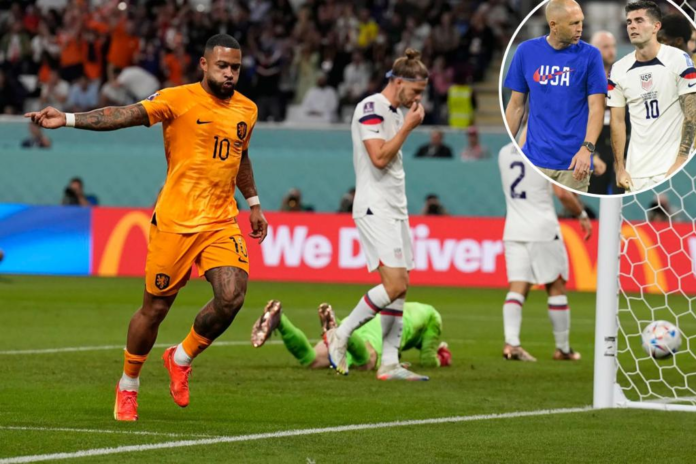Conflicted.
That was the overriding emotion the U.S. men’s national team left you with as it exited this World Cup earlier than it needed to or should have after losing to the Netherlands on Saturday in Al Rayyan, Qatar.The Americans’ 3-1 loss in the Round of 16 left you conflicted, because there were so many moments when they looked dynamic and free-wheeling and skilled and … well, like one of the best teams in the world.
Yet there were devastating mistakes made, too. Mistakes that a better, more skilled, experienced and clinical side like the Netherlands made the U.S. pay for — dearly.
U.S. soccer teased us, which was good and bad. Good because the team is absolutely better and progressing. Bad because the result was largely the same as it always is at the World Cup.
This 2022 World Cup experience for U.S. soccer also left you conflicted because the Americans showed so many elements to their program that lead us to believe we’ve truly advanced as a soccer nation.
Yet one of the primary reasons the U.S. failed to reach the quarterfinals for the second time ever was the same thing that has held the program back for all these years: No sniper goal scorers who can consistently finish scoring chances that beg to be finished.
Coach Gregg Berhalter and Christian Pulisic JB Autissier / Avalon
You needed only to look mere moments into the match Saturday to see that the U.S. — despite having a roster littered with terrific young talent — still doesn’t have the firepower to score enough.
The match wasn’t even three minutes old when 24-year-old Christian Pulisic found himself alone with the ball on his foot after a nifty Tyler Adams feed in front of the Netherlands goal, face-to-face with 6-foot-8 Dutch goalkeeper Andries Noppert.
Pulisic, whose goal against Iran on Tuesday sent the U.S. through the group stage and into the match with the Netherlands, was poised to put the Americans up 1-0 in one of the most important matches in the country’s history and to set an immeasurably huge tone for the match.
Memphis Depay of the Netherlands celebrates after scoring the opening goal for his team during the World Cup. AP
And yet, symbolic of U.S. soccer’s perennial problem, Pulisic’s in-step half-volley was parried aside by the imposing Dutch keeper with his left arm.
Pulisic said after the Iran match that he still didn’t feel he had his signature World Cup “moment’’ yet.
That was to be it.
And maybe it was, but for all the wrong reasons.
Follow all the 2022 World Cup action with more from the New York Post
There are moments in almost every important sporting event on the biggest stages that become frozen in time. Mark Messier raising his arms to Madison Square Garden’s spoked ceiling when the Rangers ended their 54-year Stanley Cup drought in 1994 was one of those.
David Tyree’s helmet catch to help win Super Bowl XLII against the Patriots was one of those. Mark Bavaro lifting Phil McConkey in the end zone in celebration during the Giants’ first Super Bowl was one. Michael Jordan had his share of them, suspended in mid-air after draining game-winning jumpers.
Until the American side can make its way back into the World Cup and advance further, Pulisic being denied in front of the Dutch goal on that third minute shot may stand as the U.S. soccer moment frozen in time from this World Cup.
Seven minutes after Pulisic’s missed opportunity, the Netherlands made the Americans pay when Memphis Depay buried a one-timer blast past U.S. keeper Matt Turner after a marvelous cross from Denzel Dumfries for a 1-0 lead the Dutch never relinquished
The Depay goal was alarming in that it was uncharacteristic of everything the U.S. had done well in this tournament: dominate in the midfield and play lock-down defense in front of Turner.
The Dutch broke down the U.S. midfield and built its attack toward Turner. When Dumfries made that cross, there was inexplicably no U.S. defender marking Dupay, who was way too open for the easy finish.
Soccer supporters watch the FIFA World Cup 2022 Round of 16 soccer match between the Netherlands and the USA at the Franklin Hall in Washington, D.C. WILL OLIVER/EPA-EFE/Shutterstock
A U.S. soccer fan watches the team’s 3-1 loss to the Netherlands on Saturday. WILL OLIVER/EPA-EFE/Shutterstock
Just before the first half ended, the U.S. then committed the mortal sin and allowed another Netherlands goal, in stoppage time, with Daley Blind scoring off another marvelous crossing service from Dumfries for a 2-0 lead.
The U.S. national team came to Qatar for with one objective in mind: Capture the imagination of America and convince us that we truly are an advancing soccer nation.
In many ways, the U.S. did just that, outplaying all three of its opponents in Group B, including a 0-0 draw against No. 5 ranked England.
“I’m super proud of the boys’ performance today,” Adams said afterward. “We can show that we can hang with the best teams in the world, some of the best players in the world. And that’s a lot of progress for U.S. Soccer. We’re moving in the right direction for sure, but we need to keep pushing cause we’re not there yet but we’re close.’’
Indeed, for all the good things they did in this tournament, the Americans left us wanting for more.
They left us conflicted.



